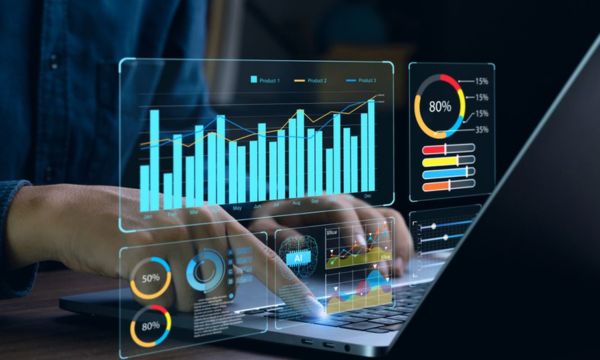Personalized AI Investments for Financial Growth
Staying ahead is important to achieve the best return on investment in the rapidly changing financial world. Since the rise of artificial intelligence (AI), personalized investment strategies have become increasingly common.
Artificial intelligence-powered platforms and tools are changing the way people trade, giving people personalized choices that take into account their financial goals, risk tolerance and market trends.
This article discusses how investing in personalized artificial intelligence can boost economic growth.
1. How Artificial Intelligence is Changing the Financial World:
Artificial intelligence has transformed many areas, and banking is no exception. Artificial intelligence is a very useful tool for investors because it can process large amounts of data, identify trends and make predictions based on this data.
The applications of artificial intelligence in finance range from algorithmic trading to risk management. By using machine learning algorithms in combination with other methods, people can create customized investment plans that meet the specific needs of each customer.
2. Customized Investment Plan:
Personalized investing in AI differs from standard investing, which takes a one-size-fits-all approach.
These solutions use machine learning algorithms to view an investor’s financial health, including income, expenses, investment objectives and risk tolerance.
For each investor, AI can create a unique investment plan tailored to their needs by understanding their preferences and constraints.
3. Make Decisions based on Data:
One of the biggest advantages of artificial intelligence for personalized investing is that it can look at large amounts of data at once.
Artificial intelligence can consider many things at once, while traditional investment methods often rely on past data and general market trends.
This helps people make better choices because AI algorithms can change based on changing market conditions and spot risks or opportunities that human investors may miss.
4. Manage Risks and Reduce Risks:
Artificial intelligence is very good at assessing and managing risk, which is a very important part of good investing.
Personalized AI investment platforms use advanced risk models to identify potential problems with investment choices.
Artificial intelligence can dynamically change investment allocations to reduce risk exposure by continuously observing market changes and figuring out how market changes affect an individual’s investment portfolio.
This proactive approach to risk management is a critical part of maintaining economic stability and protecting assets.
5. Automation Saves Time and Money:
Automation is another benefit of investing in systems managed by artificial intelligence. Artificial intelligence algorithms can easily perform everyday tasks such as rebalancing investment portfolios, figuring out the best way to pay taxes, and tracking performance.
This not only makes it easier for investors but also ensures that investment plans are tailored to preset parameters. When tasks are automated, investors can focus on greater financial planning and strategic choices.
6. Machine Learning Ensures Better Performance:
Machine learning is a form of artificial intelligence and plays a key role in improving investment success rates.
These algorithms can identify complex trends and relationships in financial data, helping investors improve over time.
AI systems learn from victories and mistakes to change and adapt. This can lead to better investment results in the long term.
7. Questions and Things to Think About:
Investing in personalized AI has many benefits, but it is important to be aware of the problems that can arise.
Key issues to consider are algorithmic biases, data privacy, and understanding the choices made by artificial intelligence.
Furthermore, because financial markets are constantly changing, AI models must constantly adapt to new situations, which requires careful maintenance and tracking.
8. Human Contact:
Artificial intelligence has many useful capabilities, but humans are still very important in making investment choices.
Investors should not view artificial intelligence as a replacement for human insight and judgment, but rather as a useful tool that can help them make decisions.
When you combine the analytical power of artificial intelligence with human insight, you can approach investing in a more complete and nuanced way.
9. Supervisory Environment:
As artificial intelligence becomes increasingly important in the banking sector, regulators have introduced rules and frameworks to ensure everything is open, fair and accountable.
As an investor, you need to understand your country’s regulations regarding artificial intelligence and choose a platform that follows ethical and legal guidelines.

Personalized-AI-Investments-for-Financial-Growth (Source – Google)
Conclusion:
Personalized AI investments are a major step forward for the financial world, offering solutions tailored to the needs and market conditions of each individual.
When investors use artificial intelligence, they can make data-driven decisions, better manage risk, and potentially even improve overall financial performance.
However, it is important to make AI decisions with an informed and balanced mindset, and to understand the pros and cons of this new way of working.
As technology continues to evolve, the future of personalized banking will likely depend on how artificial intelligence and human knowledge work together.
FAQs:
1. What is the role of artificial intelligence in personalised investing?
Artificial intelligence uses machine learning algorithms to analyse the financial status of investors and plays a key role in personalised investing.
Factors such as income, expenses, risk tolerance, and investment objectives are taken into account to create a customised investment strategy.
2. How does artificial intelligence decision-making differ from traditional methods?
Unlike traditional methods that often rely on historical data, AI processes the captured data sets in real time.
This enables better-informed decisions by adapting to changing market conditions and identifying opportunities and risks that human investors may overlook.
3. How does artificial intelligence enhance the risk management of personalised investments?
Artificial intelligence is good at assessing and managing risks through advanced risk models. These models evaluate the potential negative consequences of investment decisions, and artificial intelligence dynamically adjusts investment allocations to minimise risk exposure.
This proactive approach promotes financial stability and protects investments.
4. Which tasks in personalised AI investing can be automated?
The AI-powered investment platform provides automation for tasks such as portfolio rebalancing, tax optimisation, and performance tracking.
Automation not only reduces the administrative burden for investors but also ensures that investment strategies are consistent with defined parameters.
5. How does machine learning improve investment performance?
Machine learning can identify complex patterns and correlations in financial data to refine investment strategies over time.
As an AI system learns from successes and failures, it adapts and evolves, potentially improving long-term investment results.
 Enhancing Investment Strategies with AI
Enhancing Investment Strategies with AI
In an ever-changing financial world, it is essential to stay ahead when making smart business decisions. AI […]
More AI-Powered Stock Market Predictions for Smart Investing
AI-Powered Stock Market Predictions for Smart Investing
In the ever-changing stock market, it is important to stay ahead of the curve for successful buying. […]
More Advanced AI Solutions for Risk Management
Advanced AI Solutions for Risk Management
In the rapidly changing business world, risk management has become an important part of ensuring a company’s […]
More